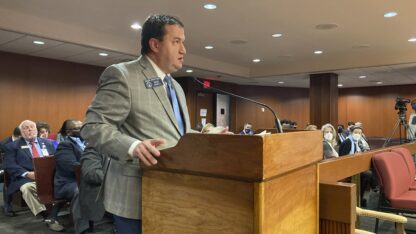For State Lawmakers, Supreme Court Ruling Highlights Need For Private Probation Bill

Georgians who can’t afford to pay off traffic tickets and other misdemeanor fines are routinely put on probation until they can pay, but that may be changing soon.
Georgia, by far, has more people on probation for low-level offenses than any other state in the country. About 300,000 at any one time, in fact. And at a rate that’s quadruple the national average.
“We have to wonder is that because people in Georgia are so much less law-abiding?” says Sarah Geraghty. “I have to believe the answer to that is no.”
Geraghty, an attorney at the Southern Center for Human Rights, places much of the blame on a 2000 state law that enabled courts to outsource probation services to private companies. She says some of these companies are charging low-income offenders unnecessary supervision fees and keeping them on probation for longer periods.
“The reason we have so many people on probation is because we have so many private probation companies,” says Geraghty. “They are profit-motivated companies and it is well past time for the legislature to act to rein in on some of these abusive practices.”
Geraghty may get her wish.
The Georgia Supreme Court Monday dealt a blow to the privation probation industry, ruling the companies could no longer recommend to judges that a probation period be extended.
For some influential lawmakers, it’s more evidence change is needed.
“I think we’re just overusing and abusing, perhaps, the need for probation,” says Rep. Wendell Willard, the Republican chair of the House Judiciary Committee.
He wants a bill that will reduce the amount of low-level offenders on probation.
“It’s just not the way to do it – to just every time somebody comes up before a judge and can’t pay a traffic fine and says, ‘I gotta have some time to pay it off,’ (and the judge says) ‘Okay, we’re going to put you on probation for twelve months.’ I think judges would agree that’s not appropriate,” says Willard.
House Minority Leader Stacey Abrams, D-Atlanta, welcomes the conversation.
“There are companies that see Georgia as a ripe business opportunity and I think we need to be a business-friendly state but not at the expense of our citizens,” says Abrams. “What (the court decision) signals to me is that the General Assembly has an affirmative obligation to ensure that any court system that uses these companies does so in a way that does not penalize the poor.”
Earlier this year, state lawmakers, led by Rep. Mark Hamilton, R-Cumming, passed a bill that would have expanded the power of probation companies and allowed them to continue charging monthly fees during extended probation periods. Gov. Nathan Deal, however, vetoed the bill, saying he opposed a provision that would have allowed the companies to keep from public view the number of people they supervised and the amount they collected in fees.
Willard says any new bill will make sure transparency is a priority. As to how Hamilton’s bill was able to pass both chambers last session, Willard says it was a rushed process:
“It came before us in a hurry, part of it. I don’t think we had time really to study the problem and what were means of making corrections. The bill last year was at first coming in as a correction or trying to correct the apparent problem that was coming out of the Richmond County court. As the bill progressed, more and more got added on to it and those things were not always what others said was necessary to be put on the bill. I think a lot of influence from the private probation companies influenced what was put in the bill. So this time we have a little more time to work with it and make an informed decision.”
Rep. Hamilton says he’s still analyzing the ruling, but acknowledged it has “potentially far-reaching impacts.” He says his bill from last session was aimed at holding probationers accountable and settling the question over whether probation companies have the authority to recommend extending sentences. Hamilton says Monday’s ruling makes legislative action even more necessary.
“It says it must be addressed so we’ve got to figure out a way to address it, hopefully this upcoming legislative session,” says Hamilton.
John Prescott, the head of the Community Corrections Association of Georgia, a lobbyist group representing many of the state’s private probation companies, says he’s disappointed by the court ruling. He denies any abuse in the system. As for this upcoming session, he says any new legislation must address scenarios in which probationers fail to pay.
“To remove the probation element removes accountability,” said Prescott. “If these persons don’t pay their fine then we’re not sure what the accountability would be so we feel like what’s in place works.”
Currently, alternatives to paying fines include community service, but the decision to offer alternatives is at the discretion of the presiding judge.
9(MDAxODM0MDY4MDEyMTY4NDA3MzI3YjkzMw004))







